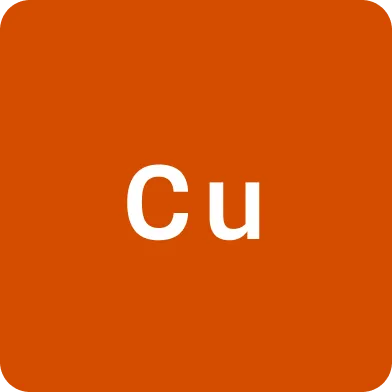Everything You Need to Know About Copper
Copper is an essential trace mineral that plays a critical role in maintaining overall health. It is vital for the formation of red blood cells, energy production, and supporting the immune system. Despite being required in small amounts, copper is indispensable for several physiological processes, from bone development to brain function. This guide explores the benefits, food sources, and how to ensure you’re meeting your daily copper needs.
What is Copper?
Copper is a trace mineral found in all body tissues and is crucial for several enzymatic processes. It helps in the production of hemoglobin, collagen, and energy, while also acting as a powerful antioxidant to protect cells from damage. Copper is stored in the liver and distributed to other tissues through the bloodstream, ensuring its availability for key biological functions.
Benefits of Copper
- Supports Red Blood Cell FormationCopper works with iron to produce hemoglobin, facilitating oxygen transport throughout the body.
- Promotes Bone and Connective Tissue HealthIt plays a role in collagen formation, supporting strong bones, joints, and skin.
- Boosts Immune FunctionCopper enhances the activity of white blood cells, helping the body fight infections and inflammation.
- Acts as an AntioxidantCopper is part of superoxide dismutase, an enzyme that protects cells from oxidative stress and reduces the risk of chronic diseases.
- Supports Brain and Nervous System HealthCopper is involved in neurotransmitter synthesis, promoting cognitive function and nerve communication.
Foods Rich in Copper
Copper is found in a variety of foods, making it relatively easy to incorporate into a balanced diet. Here are some of the best sources:
- Animal-Based Foods: Liver, oysters, shellfish, and fish.
- Plant-Based Foods: Nuts (cashews, almonds), seeds (sunflower seeds, sesame seeds), and legumes (lentils, chickpeas).
- Whole Grains: Quinoa, oats, and whole wheat bread.
- Vegetables: Mushrooms, spinach, kale, and sweet potatoes.
- Fruits: Avocados and dried fruits like prunes and apricots.
How Much Copper Do You Need?
The recommended daily intake (RDI) for copper varies by age and life stage and is measured in micrograms (mcg):
Signs of Copper Deficiency
Although rare, copper deficiency can lead to various health issues, particularly related to red blood cell production and bone health. Symptoms include:
- Fatigue and weakness due to anemia.
- Brittle bones and increased risk of fractures.
- Frequent infections or weakened immunity.
- Loss of pigmentation in the skin or hair.
- Neurological symptoms, such as tingling or numbness.
Who is at Risk for Copper Deficiency?
- People with Malabsorption Issues: Conditions like celiac disease, Crohn’s disease, or surgeries like gastric bypass can impair copper absorption.
- Individuals with High Zinc Intake: Excessive zinc interferes with copper absorption, leading to imbalances.
- Premature Infants: They may have lower stores of copper and require supplementation.
- People on Long-Term Parenteral Nutrition: Copper must be added to intravenous nutrition to prevent deficiency.
How to Ensure You’re Getting Enough Copper
Incorporating copper-rich foods like nuts, seeds, and seafood into your meals is the best way to maintain adequate levels. While copper deficiency is rare, supplements are available for those at risk, but they should only be taken under medical supervision, as excessive copper can lead to toxicity and damage to organs like the liver.
Conclusion
Copper is a trace mineral with far-reaching benefits for red blood cell production, immune support, and bone health. By including copper-rich foods in your daily diet, you can ensure that your body has the tools it needs to function optimally. Whether through whole foods or, when necessary, supplements, prioritizing copper intake is a simple yet impactful step toward better health.

